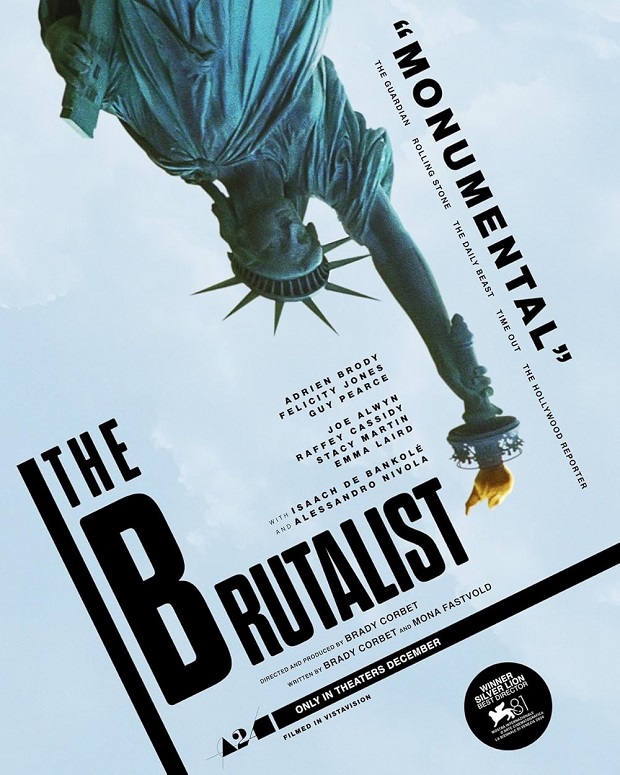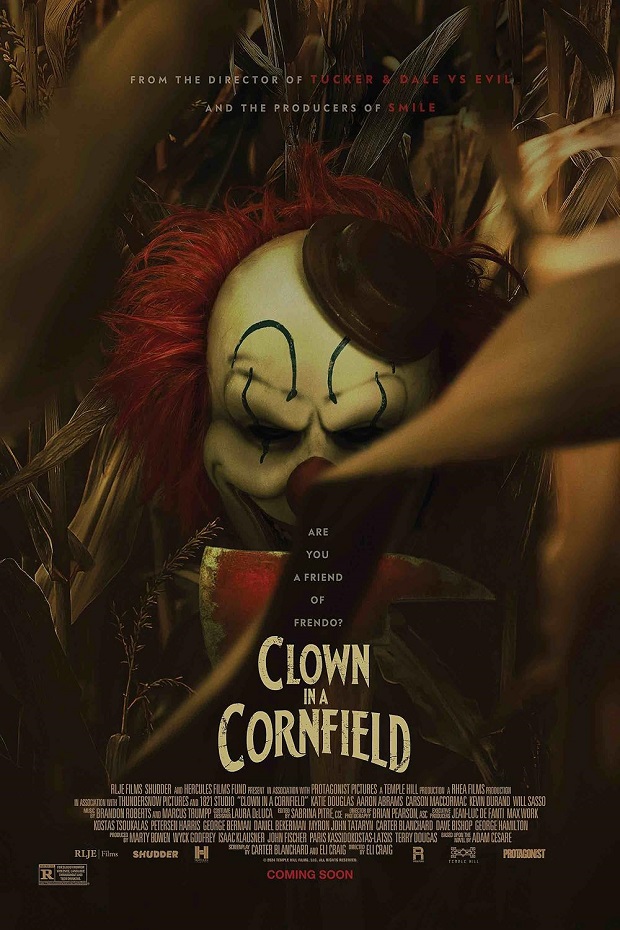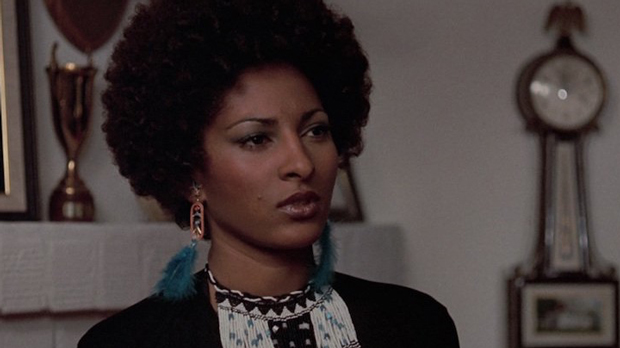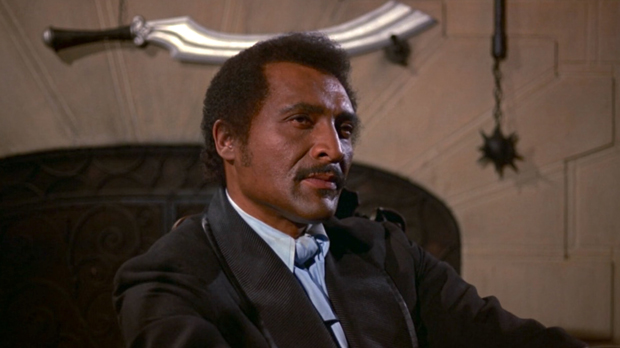 The Brutalist (2024) A24/Drama RT: 214 minutes (including a 15-minute intermission) Rated R (strong sexual content, graphic nudity, rape, drug use, some language) Director: Brady Corbet Screenplay: Brady Corbet and Mona Fastvold Music: Daniel Blumberg Cinematography: Lol Crawley Release date: December 20, 2024 (US, limited)/January 24, 2025 (US, wide) Cast: Adrien Brody, Felicity Jones, Guy Pearce, Joe Alwyn, Raffey Cassidy, Stacy Martin, Enna Laird, Isaach de Bankole, Alessandro Nivola, Michael Epp, Jonathan Hyde, Peter Polycarpou, Maria Sand, Salvatore Sansone, Adriane Labed, Zephan Hanson Amissah, Bennett Vilmanyi.
The Brutalist (2024) A24/Drama RT: 214 minutes (including a 15-minute intermission) Rated R (strong sexual content, graphic nudity, rape, drug use, some language) Director: Brady Corbet Screenplay: Brady Corbet and Mona Fastvold Music: Daniel Blumberg Cinematography: Lol Crawley Release date: December 20, 2024 (US, limited)/January 24, 2025 (US, wide) Cast: Adrien Brody, Felicity Jones, Guy Pearce, Joe Alwyn, Raffey Cassidy, Stacy Martin, Enna Laird, Isaach de Bankole, Alessandro Nivola, Michael Epp, Jonathan Hyde, Peter Polycarpou, Maria Sand, Salvatore Sansone, Adriane Labed, Zephan Hanson Amissah, Bennett Vilmanyi.
Rating: ****
You don’t just watch The Brutalist; you get enveloped by it. No other film this year has accomplished such a feat. Thanks to director Brady Corbet’s (Vox Lux) bold use of VistaVision, a widescreen process that involves loading the film into the camera horizontally, it’s an immersive experience as epic as it is intimate. It’s unlike any film you’ve seen this year.
I’m a little late in reviewing The Brutalist. It didn’t open in my area until this past Friday. The day before that, it was announced that it was up for ten Oscars including Best Picture, Best Director and Best Actor for leading man Adrien Brody who already has golden statuette on his mantle for his marvelous performance in the 2002 Holocaust drama The Pianist. He may just walk away with a second for his brilliant portrayal of Laszlo Toth, a Hungarian Jew and Holocaust survivor in search of the American Dream. He learns that it’s attainable but at a cost.
Corbet goes old school with the structure of The Brutalist. It’s divided into two parts with a 15-minute intermission in between and an epilogue at the end. It opens with a brief overture followed by the scene of Laszlo’s arrival in the US. He makes his way out of a cramped space on the boat to the deck where he basks in the sunlight while gazing in wonder at the Statue of Liberty. Corbet, working in wonderful harmony with cinematographer Lol Crawley, warps the moment by showing the iconic landmark upside down at the top of the frame. It then shifts to the side. It’s never shown upright which tells us that Laszlo’s American experience will present itself differently. It’s an unforgettable opening to an unforgettable film.
Laszlo, an extraordinarily gifted architect, starts his new life in America working for his cousin Attila (Nivola, The Art of Self-Defense) at his furniture store in Philadelphia. As a newly arrived immigrant, he’s overjoyed and overwhelmed by the prospect of a new life in a free country where the streets aren’t paved with gold. He lives in a small room at the back of the store. He stands in line for a bowl of soup and a slice of bread. Later, after a falling out with his cousin, he lives in a homeless shelter where he shoots up heroin with his friend Gordon (Bankole, Casino Royale), also an outsider. On top of all this, Laszlo is trying to find a way to bring his wife Erzsebet (Jones, The Theory of Everything) and niece Zsofia (Cassidy, Vox Lux) to America.
Laszlo finds a patron in Harrison Van Buren (Pearce, L.A. Confidential), a wealthy industrialist who commissions him to design and build a huge community center in Doylestown as a monument to his late mother. He invites him to move into a guest house on his property and gives him carte blanche on the project. In addition, a lawyer friend of Van Buren’s offers to help facilitate his family’s immigration to the land of the free. It feels like a dream. Of course, all good dreams must come to an end.
The Brutalist is NOT a movie to be enjoyed. It’s a film to be experienced and absorbed. It’s entertainment, but not in the same way as A Complete Unknown or Dune: Part Two. It deals with heavy subject matter- e.g. immigration, addiction, Zionism, class and the aftereffects of wartime horrors. When Laszlo finally reunites with his family, he learns that his wife is confined to a wheelchair due to osteoporosis and his niece doesn’t speak due to some unspecified trauma. Van Buren’s prejudice (religion and class) becomes clearer as the project drags on for years. Then something happens in Italy that really shakes things up.
Brody gives his best performance since The Pianist. Laszlo is a good man consumed by a massive artistic undertaking that’s more personal than anybody realizes. Already obsessed, he really starts to unravel after the incident in Italy. What Brody does here is a lesson in emotional range and how to properly control it. You can see his character eroding as joy turns to anger and disillusionment. This is a man once filled with hope. Now he’s struggling just to keep it and his family together. It’s not that he lost control of it all; he never had it to begin with.
Pearce, who’s nominated for Best Supporting Actor, turns in an equally powerful performance as a rich, powerful monster of a man with a penchant for using people and throwing them away once he gets what he wants from them. He always has to be in control and make sure everybody knows it. His treatment of Laszlo is one of condescending disguised as kindness and generosity. Pearce, in turn, lets us know Van Buren is the villain without actually coming right out and saying it. It shows in how he flatters Laszlo, patting him on the back with one hand and flipping him off with the other (figuratively speaking).
Jones’ performance, although shaky at times, is very good as Erzsebet, the understanding wife who’s tougher than she looks. She loves her husband and doesn’t hesitate to speak up when he’s not acting right. She has a powerful scene near the end when she confronts Van Buren about his treatment of Laszlo. Cassidy is also quite good as the mute Zsofia. Her countenance tells the audience more about the level of trauma she endured than any monologue.
The Brutalist is a visual and emotional masterpiece. It’s a film as ambitious as the structure Laszlo is building. The screenplay by Corbet and Mona Fastvold (Vox Lux) is intelligent and thought-provoking. It speaks to an immigrant’s personal experience in an unfiltered way. It doesn’t soft-pedal it by looking at it through rose-colored glasses. It’s epic in scope, but still manages to be intimate, telling the story of one man and his challenges as he struggles to adapt and achieve the elusive American Dream. It’s not a cheery tale with a happy ending, but it’s still one worth hearing. The Brutalist is compelling work from start to finish. Don’t miss it.




